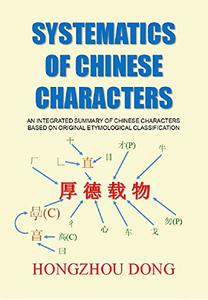
Systematics of Chinese Characters: An integrated summary of Chinese characters based on original etymological classification by Hongzhou Dong
English | 2021 | ISBN: N/A | ASIN: B08Y8ZZRJQ | 198 pages | PDF | 5.53 Mb
All of the thousands of Chinese characters were created gradually in history by ancient people. The methods created Chinese characters can be classified as six types. It is very important and helpful to understand some etymology principles on Chinese characters. Even in China, currently few people have learned much about Chinese etymology. People usually learn and remember Chinese characters by their radicals, strokes, meaning and pronunciation. However, few people know why a Chinese character gained its current appearance, and what are the really logic to constitute each of the tremendous Chinese characters.
Many foreign people would say learning Chinese is more difficult than learning other languages, because need remember thousands of Chinese characters, comparing with only 26 Latin letters. The most difficult aspect is that we should remember the pronunciation of each Chinese character, other than recognizing the pronunciation by spelling.
So some scholars have written books and dictionaries to introduce Chinese etymology. However, in some of these books, only introduce hundreds of Chinese radicals separately. Readers still did not grasp the rules on Chinese etymology so cannot analyze other characters which are not explained in the books. In many books and dictionaries, Chinese characters are classified and sorted by phonetics, stroke types and/or stroke counts. But the radicals and strokes are based on current simplified Chinese characters. Many radicals were contracted or transformed from other radicals or radical combinations. Many of the names of radicals mislead readers.
In this book, the major principles of Chinese etymology are introduced. And the names of radicals are showed with the original meanings and the original pronunciations. The major radicals are classified systemically by the natural properties and original relationships. The most important radicals and which have the most types of variants are 人, 手 and 止. So there are three independent chapters in this book to specify these three radicals. If readers grasp the variant expressions of 人, 手 and 止, will open a great door to understand a hundred of other radicals and tremendous Chinese characters.
This book summarizes the characters which share very relevant sources, such as 久, 夂, 夊 and 㐄. Some characters are inverted right to left from other characters, or show upside-down forms of other characters, such as 从 and 比, 后 and 司, 癶and 舛. So these characters have the same, similar or opposite meanings. When use these characters as radicals in compound characters, these relationships are shortcuts to understand the compound characters. In most of existing books and dictionaries, radicals are usually sorted by phonetics, stroke types and/or stroke counts. It is hard to image that characters 从 and 比, 后 and 司, 癶 and 舛 have so close relationships, respectively. In this book, they are classified together in the same table or section.
This book will explain the etymology sources of about 1,800 Chinese characters, which are compounded by about 250 basic pictographs. Many of these 1,800 Chinese characters will go no to make up of other complicated characters. So through the explanations of a few characters can show readers the whole picture of all Chinese characters. After read through this book, it will become very easy for you to understand other thousands of Chinese characters.
Links are Interchangeable - No Password - Single Extraction



